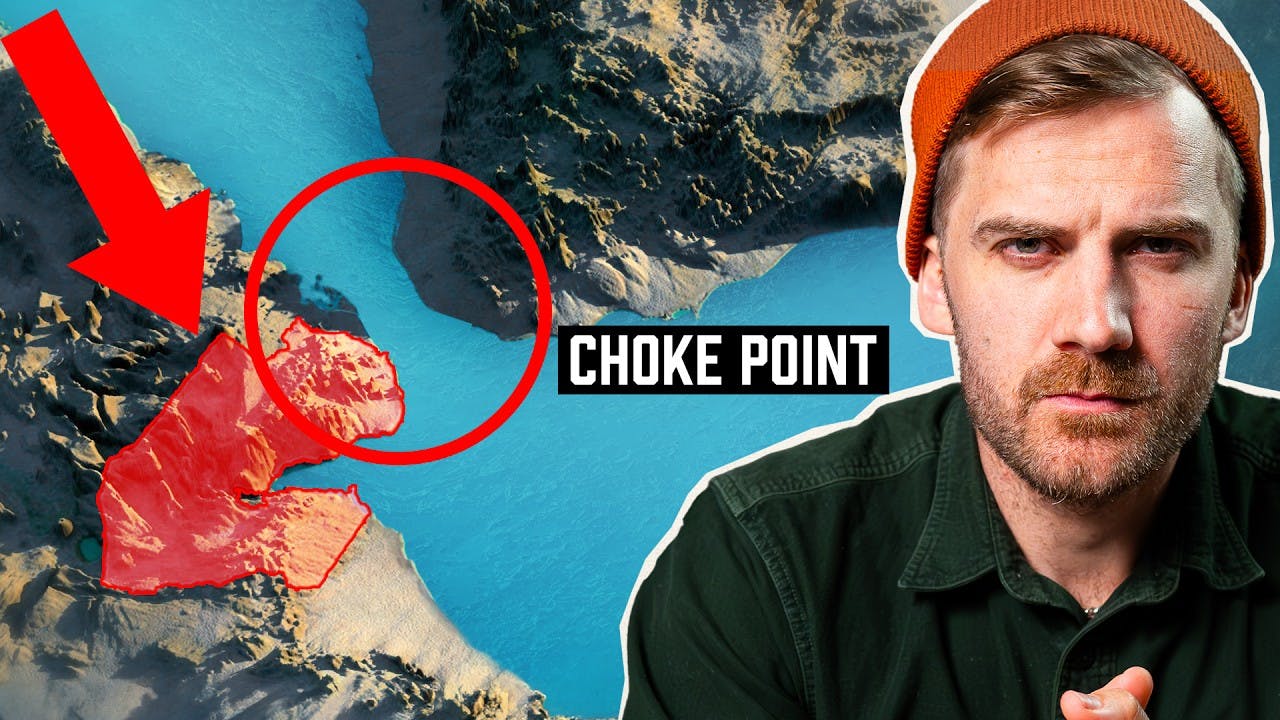The most important country you’ve never heard about
()

Intro (00:00:00)
- Djibouti, a small country strategically located at the Red Sea's choke point, hosts military bases of several nations, including the US, France, Japan, and China.
- Due to its strategic position, Djibouti plays a crucial role in global rivalries and tensions, making its stability essential for maintaining free trade and preventing regional conflicts.
- Despite being one of the poorest countries globally, Djibouti has successfully balanced the interests of various powers without succumbing to their influence.
- Ground News, a news aggregator, promotes balanced news consumption by presenting articles from diverse sources with different perspectives.
- The sponsor, Ground News, offers a 40% discount on the Vantage plan, granting access to all its features.
Geography makes history (00:05:36)
- The Strait of Bab-el-Mandeb, also known as the Gate of Tears, was a dangerous and treacherous passage due to strong winds, unpredictable crosscurrents, and shallow reefs.
- The Suez Canal, constructed by a French company, revolutionized trade and significantly reduced the travel time between Europe and Asia.
- The strategic importance of the Suez Canal led to a scramble for control among European powers, with Britain, France, and Italy vying for influence in the region.
- France acquired a small island at the choke point of the Strait of Bab-el-Mandeb and established a lighthouse and a port.
- Italy purchased a stretch of coastline from local Sultans and established the colony of Eritrea.
- France focused on acquiring a strip of sparsely populated coast, which would become Djibouti, in exchange for protection.
- The French colony of K Fran de Somali (French Somaliland) served as a key base for projecting power and refueling during their colonial expansion in Asia.
- Despite the wave of decolonization after World War II, France maintained control of Djibouti until 1977 when the country gained independence following protests and clashes with local authorities.
Djibouti’s new reality (00:08:50)
- Djibouti's strategic location at the choke point of the Red Sea has made it a key location for international trade and commerce.
- After the 9/11 attacks, the United States established a permanent military base in Djibouti, making it a crucial hub for counter-terrorism operations in the region.
- Djibouti serves as a vital gateway for Ethiopia, facilitating 95% of its trade, and has also attracted military presence from other countries such as Japan, Italy, Spain, and Germany, to ensure the security of the trade route.
- The country's economy has flourished from leasing its ports and territories to foreign nations, generating substantial revenue and attracting foreign investment and development.
China builds a base (00:14:28)
- China sets up a support base in Djibouti, near the US base, in 2016.
- China claims the base is to combat piracy, but the issue had largely subsided by 2017.
- China builds a large pier capable of handling aircraft carriers and nuclear submarines.
- China invests in infrastructure projects in Djibouti, such as a railway, pipeline, and port, increasing Djibouti's debt to China.
- Djibouti becomes the only place with US and Chinese military bases in close proximity.
- There have been accusations of spying and the US alleges that China pointed lasers at pilots.
- Russia wanted a base in Djibouti but was denied.
Local impacts (00:16:42)
- Djibouti has a population of almost a million people.
- The US base, along with French and Chinese bases, support an undemocratic regime accused of human rights abuses.
- Foreign aid from the bases has helped reduce hunger and support the economy.
- There are concerns about accidents, such as drones crashing into civilian infrastructure.
- US soldiers mostly keep to themselves and do not buy goods locally.
- The bases create a "slice of America" in Djibouti, with US soldiers not even drinking local water.
Geopolitics on steroids (00:19:37)
- Djibouti is located in a strategically important region, known as the Horn of Africa.
- Neighboring countries and external powers have vested interests in the region due to its potential as a future food basket and access to the sea.
- Ethiopia relies on Djibouti as its primary access to the sea for trade and food imports.
- Djibouti's complex geopolitical situation arises from its role as a host to military bases of various countries, including the United Arab Emirates (UAE), Qatar, and China.
- The UAE and Djibouti had a close relationship, with the UAE investing heavily in Djibouti's port, which is crucial to Djibouti's economy.
- However, the UAE's growing ties with Eritrea, Djibouti's rival, strained their relationship.
- In 2017, a conflict between the UAE and Qatar, which also had a military presence in Djibouti, led to Qatar withdrawing its troops.
- Eritrea took advantage of the situation and seized some of Djibouti's territory.
- Djibouti skillfully navigated these complex geopolitical dynamics by playing different powers against each other.
- To reduce its dependence on the UAE, Djibouti granted a significant portion of its port to China, a rising global power.
- This move strengthened Djibouti's position and lessened the UAE's influence.
Conclusion (00:22:58)
- Djibouti's strategic location makes it a vital geopolitical player.
- The chokepoint near Djibouti is becoming increasingly important due to rising tensions between regional powers.
- Djibouti's role as a host to rival military bases creates a complex balancing act for its government.
- As great powers increasingly compete for vital resources and geographies, the risk of conflict escalates.
- Djibouti's future stability depends on its ability to navigate the delicate balance between cooperation and competition among major powers.
- New York Times' digitized newspaper archive, the Times Machine, provides valuable historical information.
- Search Party, a new channel by former Vox Atlas creator Sam Ellis, covers geopolitics and global sports.
- Patreon supporters of the channel enable independent journalism and gain access to behind-the-scenes content and scripts.
- An upcoming project focused on Japan promises a deeper and more comprehensive approach to storytelling.